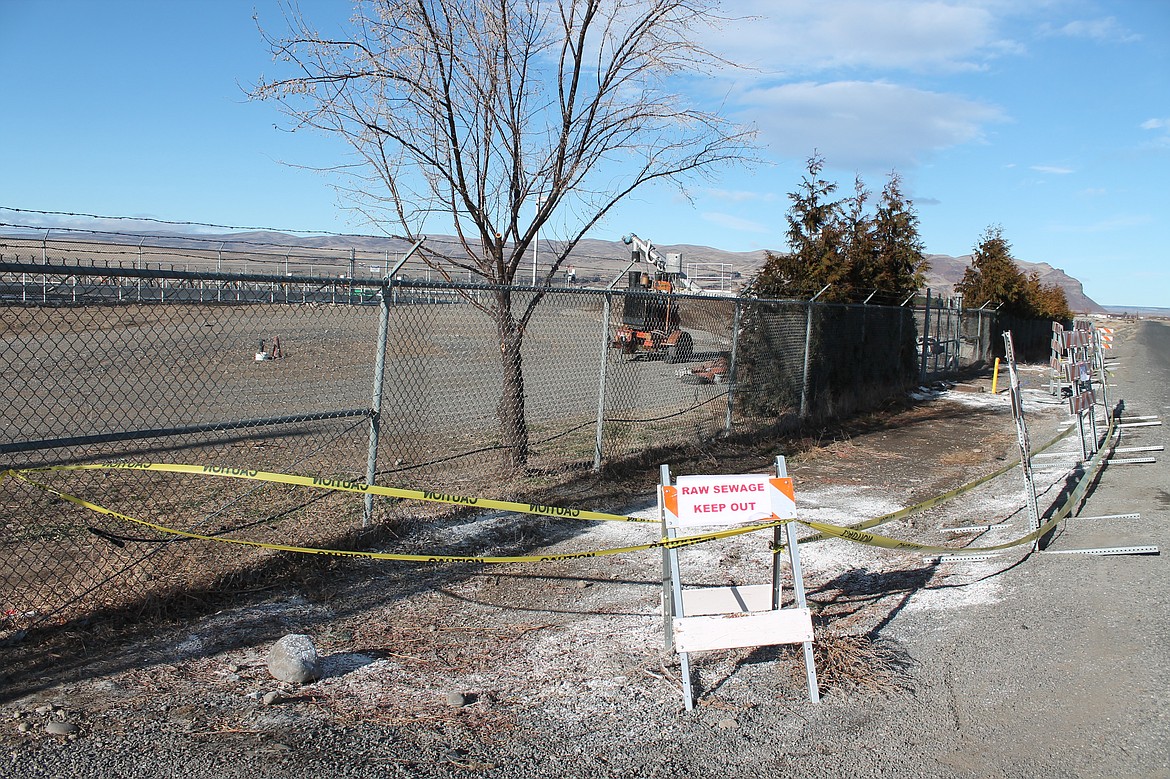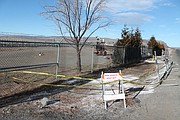Work continues to rebuild the Mattawa Wastewater Treatment Facility
MATTAWA — It has been 10 months since the Mattawa Wastewater Treatment Facility blower room was destroyed by a fire. Since that time, progress has been made on repairing the facility, with work expected to be completed in the next few months.
While the origin of the fire has been linked to an electrical panel in the blower room, the exact cause of the fire is unknown. However, there were events that preceded the fire that have raised some speculation among community members.
On the evening of Wednesday, Jan. 8, 2020, the area directly west of Mattawa, extending down past Desert Aire, experienced a power outage. The outage started at 6:51 p.m. and affected 1,608 people, according to Ryan Holterhoff, Grant County PUD public affairs officer, in an interview with The Sun Tribune that month. Power was restored to the area at 10:08 p.m.
But the load of all the heaters in the area attempting to turn back on at the same time was too much for the system to handle and another power outage occurred at 10:24 p.m. The second outage only affected 300 customers. Power was totally restored to the area after 6 a.m. the next morning.
The wastewater treatment facility was one of the locations affected by the power outage. The outage in the area of the 2,000-square-foot building was caused by a low oil alarm on one of the transformers at the substation. Power was out for a little over three hours while crews temporarily transferred customers over to a different transformer. Repairs to the offending transformer were completed and customer loads routed back as normal at 6:09 a.m.
Meanwhile at the Mattawa Wastewater Treatment Facility, a fire started in the electrical panel that was located in the blower room. The ruling on the cause of the fire was made by a third-party investigator hired by the city’s insurance company. The exact time the fire started is unknown, but is thought to have been around 2 or 3 a.m.
“We have an estimated time,” said Juan Ledezma, public works director for the city of Mattawa.
That estimated time is based on the size of the room destroyed and how hot the fire was when the fire department arrived on the scene. It is speculated that once the fire got ignited, it found fuel, such as oil and aerosol cans, that caused the fire to get hot very quickly. When fire crews arrived on the scene, the exterior of the building was determined to be over 600 degrees, according to information obtained by The Sun Tribune from Grant County Fire District No. 8 Fire Chief David Patterson in the days immediately following the fire.
That same evening about 10:30 p.m., Kevin Webster, one of the operators of the wastewater facility plant, noticed that he was unable to connect remotely to the computer system at the plant. According to Ledezma, Webster attempted to check on the facility remotely because the power was out and he wasn’t surprised when he couldn’t remote in. In the past, when a power outage occurred, the generator at the facility would kick on and keep the equipment, including the computer monitoring the system, running, but the internet sometimes quit working. Webster, who was not on call that night or scheduled to be at the plant the next day, assumed that was the case and went to bed planning to attempt to remote in again the next morning.
The next morning, Webster was still unable to check on the computer remotely. He went down to the treatment facility, arriving around 5:30 a.m. When he arrived, he noticed that the area around the facility looked foggy. Realizing that the fog was really smoke coming from the facility, he called 911.
When fire crews arrived, the thermal cameras used by the fire department showed the building exterior to be over 600 degrees. In the January interview, Patterson said that it took crews an hour and a half to extinguish the fire and another hour to mop up. The blower room portion of the wastewater treatment facility was a complete loss.
With the blowers in flames, city staff began searching for a way to replace them quickly. The blower system gives air to the good bacteria that live in the facility’s lagoon. Two diesel compressors were located and brought in to do the work of the destroyed equipment.
In the process of getting the facility up and running, some sewage spilled. The spill happened between 8 and 9:30 a.m. The spill contained untreated liquid waste. In the five-day report required by the Washington State Department of Ecology, Ledezma reported that an estimated “7,000 to 10,000 gallons of sewage was spilled based on the time it took to set up pipes and trash pumps as the WWTP (wastewater treatment plant) had no source of power.” Of that, an estimated 2,000 gallons was removed from the ditch between the facility and Road U Southwest. Working with the Grant County Health Department, the spill was cleaned up by 4 p.m.
Two days later, on Saturday, Jan. 11, the Mattawa City Council voted to rent two blowers until the building could be repaired and new permanent ones could be installed. The council also approved taking out a loan from the Washington State Department of Ecology to pay for the repairs until the insurance reimbursement comes in.
There are several factors that might have contributed to the fire.
One factor may have been the power outage. In an article published in The Sun Tribune on Wednesday, Jan. 15, it was stated that the power outages had not affected the city’s wastewater treatment facility. However upon further examination by Sun Tribune staff, it was discovered that in the initial information provided by the Grant County PUD, the PUD had identified the Port of Mattawa’s Wastewater Treatment Facility and had given The Sun Tribune information based on that facility, not the city’s facility.
In the course of the newspaper’s investigation, it was discovered that the city’s wastewater treatment facility had indeed been affected by the power outage. New reports provided by the PUD indicate that the facility did experience power failure from 6:51 to 10:08 p.m. In the wastewater treatment facility generator logs obtained by The Sun Tribune, the logs indicate that between Jan. 8 and Jan. 9, the generator ran 9.8 hours. This includes run time in the hours that the power was off and numerous times that the generator kicked on in the aftermath of the fire.
There were rumors at the time of the fire that power surges had been associated with the power outage. When asked if there had been any power surges, Holterhoff said that he was unable to confirm or deny if any had occurred.
Another factor that may have contributed to the fire was the age of the building. According to Mattawa Mayor Scott Hyndman, the facility is over 20 years old. At the time the building was constructed, the electrical panel was up to code. He also said that the last time the city changed insurance companies, an inspector was sent out to look at the condition of the building. When asked if anything had been said about replacing the electrical panel, Hyndman said that he wasn’t aware of any such request.
“They would have made us change it, I imagine,” Hyndman said.
The building also did not have a surge protector, fire alarms or a sprinkler system. Ledezma said that for a building of its type, fire alarms are not typically installed.
“The nearest neighbor is a quarter-mile away,” Ledezma said.
He also cited the age and size of the building as reasons that no sprinklers were installed. No reason was given as to why the building lacked a surge protector other than the one connected to the computer.
As the city fixes the damage caused by the fire, it is taking measures to prevent a fire from happening again. Instead of having the electrical panels in the same room as the blowers, a separate electrical room is being built and air conditioned. Both the power and internet connections are getting backups.
“We want a double safeguard to prevent anything like this from happening again,” Ledezma said.
Currently, the facility rebuild is entering its second phase. The first phase involved ordering new blowers, which have a long lead time. Phase 2 involves rebuilding the facility and having it ready for the blowers to arrive. On Thursday, Oct. 15, the Mattawa City Council approved Apollo Construction as the contractor for the project. The installation of the blowers will be Phase 3. Ledezma said he hopes the project will be done at the end of December or beginning of January.
Once the rebuild is complete, the city of Mattawa will be doing some previously planned upgrades on the facility’s clarifiers.



